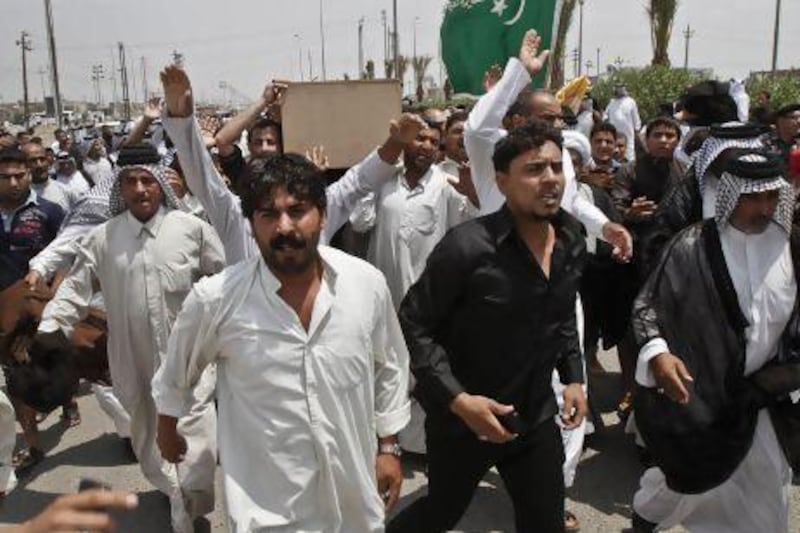BASRA, Iraq // The fighter's body was collected at an Iraqi border crossing with Iran, then carried on Monday through the streets of this southern city as mourners hailed his sacrifice in protecting a revered shrine in Syria.
Diaa Mutashar Al Issawi was one of several Shiite fighters from Iraq who have trickled into Syria for months, providing a measure of support for Syrian regime forces battling mainly Sunni rebels. They are drawn by a sense of religious duty to ensure the sanctity of the revered Sayida Zeinab shrine outside Damascus as sectarian divisions harden in Syria's civil war.
Al Issawi is not the first Iraqi Shiite fighter thought to have died in Syria. But Iran's alleged role in repatriating his body strengthens suggestions that Tehran is involved in coordinating the movement of foreign fighters to aid President Bashar Al Assad.
Iraq remains officially neutral in the Syrian conflict, and officials had no comment on the return of Al Issawi's body.
But the Shiite-led government in Baghdad fears Mr Al Assad's ouster would lead to the rise of a conservative Sunni government in Syria. That could fuel renewed Sunni-Shiite strife in Iraq, where sectarian violence is on the rise. Mr Al Assad's Alawite sect is a branch of Shiite Islam.
"It was a religious and ethical duty to go to Syria and defend our holy shrines," said an Iraqi Shiite fighter from Basra who referred to himself only by the nickname Abu Zeinab, fearing reprisals. "Martyr Diaa and I fought together," he said.
Witnesses in Basra saw Al Issawi's coffin - similar to the those Iran once used to repatriate the dead during the Iran-Iraq War - leaving atop a vehicle from the Iraqi side of the Shalamcha border crossing with Iran. Masked men at the scene insisted photographers not take pictures as a convoy of 20 cars departed.
At a funeral procession later in the morning, police blocked roads as dozens of tribesmen and Shiite clerics carried the coffin through the streets.
Some in the crowd vowed to make a similar sacrifice and chanted slogans against the Sunni-dominated Free Syrian Army rebel group and Jabhat Al Nusra, which in the past year has become the most effective fighting force within the opposition trying to topple Assad. Al Nusra pledged alliegence to Al Qaeda this year.
It is difficult to say how many Iraqi fighters have made their way to Syria. Iraqi officials insist they are not involved and do not know how many of their citizens are fighting across the border.
"If there are Iraqi fighters in Syria, then they went on their own," said Ali Al Moussawi, a spokesman for Iraq's prime minister. "Our position is clear. The Iraqi government is not part of this."
Aram Nerguizian, a Middle East expert at the Centre for Strategic and International Studies in Washington, said Iraqi and Lebanese Shiites form "an important rear guard" for Syria's Assad as his own forces try to make advances against the rebels. "I'd be frankly surprised if you didn't see an uptick" in the number of Iraqi fighters, he said.
Syrian rebels accuse members of the Lebanese Hizbollah movement of fighting alongside Assad's troops and attacking rebels from inside Lebanese territory.
Mr Nerguizian said Iraqi Shiite fighters traveling to Syria are certainly coordinating with Iran to some extent, though it is unclear how much Tehran is calling the shots.
One area of coordination might be in providing transport, since flying Shiite fighters to Syria out of Baghdad might damage Iraq's international standing and expose it to greater American pressure.
"If you have Iraqi Shia going by land to Iran and then on to Syria, that creates a zone of ambiguity," Nerguizian said.





